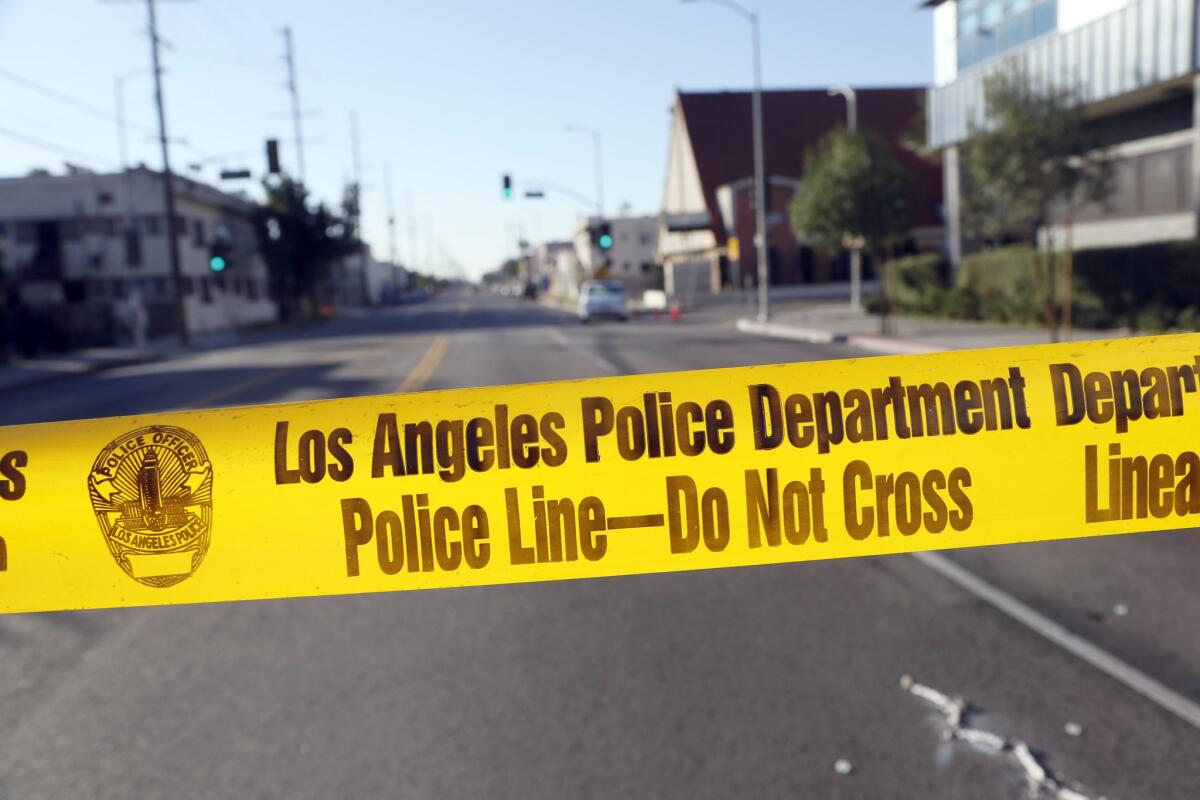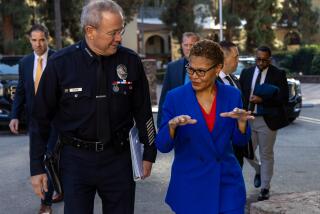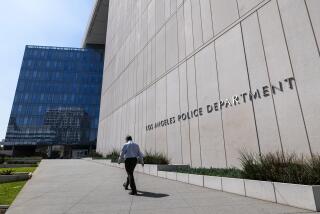LAPD investigates ‘blue flu’ claims after officers call in sick over July 4 holiday

An unsigned letter circulated among the Los Angeles Police Department rank and file last week, encouraging officers to call in sick to protect their own interests.
It had been a month of upheaval for police, with unprecedented protests over police killings of Black people and the Los Angeles City Council agreeing to cut the LAPD’s budget by $150 million amid calls for sweeping reforms.
“They succeeded in defunding the police; what do you think is next? Our pay? Our benefits? Our pensions? You’re God Damn right all those things are in jeopardy now,” read the letter, which was obtained by The Times. “We have to send the city a clear message that we are not expendable and we are not going to take this crap anymore.”
Now, LAPD commanders are investigating whether an unusual spike in officers calling in sick over the July 4 weekend was the result of an orchestrated protest or labor action, which would be illegal. Sources in the department told The Times up to 300 officers called in sick in what many in the department suspect was a “blue flu.”
It came on a weekend with an unusually high number of homicides and shootings and as residents complained of illegal fireworks exploding all across the city.
In certain anti-gang units, everyone or nearly everyone called in sick at once, sources said.
LAPD Chief Michel Moore said there could be several reasons why officers called in sick, particularly given rising COVID-19 cases within the force and throughout Los Angeles County. But he also acknowledged signs that certain officers and units called in as part of a concerted action.
Officers who knowingly participated in such an effort would be guilty of misconduct and punished, Moore said, but he did not have a timeline for when the internal probe would wrap up. As of Tuesday, he was still talking to front-line supervisors like sergeants and lieutenants about the pattern and any justifications they may know of, including any coronavirus concerns among officers and their families.
“Rather than jumping to conclusions and indicting and impugning the integrity of our rank and file, I’m asking that we explore this,” Moore said. “We want to find the facts out before we start making sweeping judgments.”
The move comes just weeks after LAPD officers called in absent for nearly 700 shifts on Los Angeles County’s transit system after Moore temporarily froze overtime pay. But major coordinated sick calls are not common in the LAPD. More common are actions in which officers report for duty, but are intentionally less proactive.
Najee Ali, a longtime civil rights activist in South L.A., where many of the sick calls occurred, said the effort was clearly intended to punish activists for demanding police funding be reallocated elsewhere, and should be a huge cause for concern to top officials.
“It has not gone unnoticed by the residents,” Ali said. “It highlights the lack of character and integrity of those who are supposed to serve the community. They are the ones jeopardizing public safety.”
The department has specific protocols for officers to report COVID-19 symptoms or exposure, which Moore said would help them determine what role the virus played in reducing weekend staffing.
It certainly played some role. As of Tuesday, Moore said 323 employees had tested positive for COVID-19, with another 231 awaiting results. A total of 250 personnel, including 160 sworn officers and 90 civilian employees, were under quarantine, representing a threefold increase in the number of sworn officers in quarantine compared to this time last month. At least one officer has died.
Moore said the department staffed up heavily before the holiday weekend based on high call volumes in past years, including for fireworks, and was able to divert officers as sick calls rolled in to ensure that patrol shifts were fully staffed throughout the weekend.
He said he was aware of the calls for an orchestrated “blue flu” — both in Los Angeles and across the country — but that they were not the motivation for the increased weekend staffing.
The Los Angeles Police Protective League, which represents rank-and-file officers on labor issues, said it was not behind the effort. In fact, the union sent an email to its members discouraging them from participating.
“We have heard some unsubstantiated rumors of a potential ‘Blue Flu’ where officers would coordinate to call in sick for the same day. We urge you to not take this action,” the LAPPL wrote. “The Board of Directors of the Los Angeles Police Protective League unequivocally condemns any attempt to engage in a ‘Blue Flu.’ It is wrong, it is illegal, and it is contrary to the oath we all took as police officers to protect our community.”
Because of the danger to public safety, it is illegal under state law for police officers to go on strike.
Still, according to a source with knowledge of the situation, at least 91 officers called in sick in the Southeast Division alone, with another 31 doing so in the Southwest Division. There were also greater than normal sick calls in the 77th Division and in the Foothill Division. Anti-gang units in Foothill, Southeast and Southwest all called in sick, the source said.
Moore said he did not know how many officers in each division called in and could not provide a total figure, but collecting that data would be part of the review.
“Certainly it was higher than normal, and we’re trying to figure it out,” he said.
Both Moore and Josh Rubenstein, a police spokesman, said the “vast majority” of officers who were scheduled to work showed up for their shifts.
Craig Lally, president of the union, agreed, and said commanders won’t know why officers called in sick until they talk to them to determine “whether it was a sickout or COVID or they had a headache.”
Steve Gordon, a former LAPPL board member who still advises many officers, said he discouraged officers from calling in sick because he believed it would alienate city residents and lead to officers being retaliated against or disciplined by the department.
Instead, Gordon is encouraging officers to participate in a “LAPD Appreciation Rally” at police headquarters on Saturday, where he said they can channel their frustration with city and police officials not standing up for them or the progress the department has made in recent years.
Police and city officials have long equated robust staffing of police on the streets with declines in violent crime, though criminal justice reform groups have questioned the correlation. The City Council’s recent cut to the LAPD budget is based in part on the premise that funds typically allocated to police would be better spent on mental health clinicians and other first responders who are trained to treat people in crises rather than arrest them.
No one has suggested that officers calling in sick over the weekend caused crime to spike. However, certain crimes — namely homicides and shootings — have been on the rise.
There were 19 homicides in the city from June 21 to July 5, compared to nine during the same period last year, according to Capt. Paul Vernon. There were six between Friday and Sunday alone.
Moore said violent crime remains down overall, on a year-over-year basis, but homicides are up and shootings are surging, particularly in South L.A. He said it is not exactly clear what is driving the violence, which has been seen in other cities as well, but it appears to be a mix of factors including individual disputes, heat, economic uncertainty amid the pandemic and gang violence.
“We’re watching it very closely. It’s a hot summer and I’m very concerned. This is a unique time with this pandemic and the economic impact of unemployment and loss of jobs and of people’s livelihoods,” Moore said. “It’s a very unique time in American history, and how it is impacting us in street violence and crime in our neighborhoods is something we don’t have all the answers for.”
More to Read
Sign up for Essential California
The most important California stories and recommendations in your inbox every morning.
You may occasionally receive promotional content from the Los Angeles Times.












